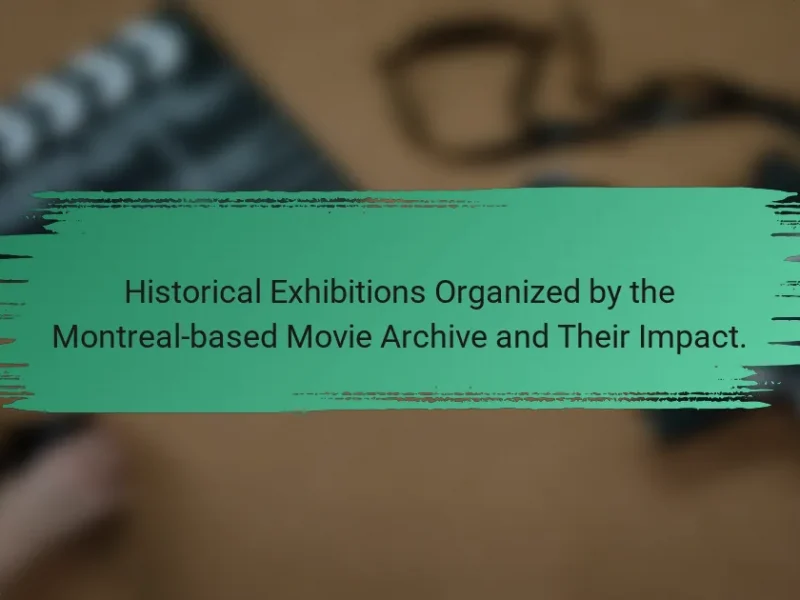The Montreal-based Movie Archive is a film preservation organization dedicated to collecting, restoring, and archiving cinematic works. It plays a crucial role in maintaining film history by utilizing advanced technology for digitization and repair of damaged footage. The Archive collaborates with various institutions to enhance film restoration projects and provides access to a diverse collection of films for researchers and film enthusiasts. Its efforts not only safeguard significant Canadian films but also promote awareness of restored works through screenings, contributing to the cultural heritage of cinema.

What is the Montreal-based Movie Archive?
The Montreal-based Movie Archive is a film preservation organization. It focuses on collecting, restoring, and archiving cinematic works. The Archive plays a vital role in preserving film history. It collaborates with various institutions for film restoration projects. The organization aims to maintain the cultural significance of films. It houses a diverse collection of films from different eras. The Archive also provides access to researchers and film enthusiasts. Its efforts contribute to the broader field of film heritage.
How was the Montreal-based Movie Archive established?
The Montreal-based Movie Archive was established in 1968. It was created to preserve and promote Canadian cinema. The initiative was driven by a group of filmmakers and archivists. They recognized the need to safeguard film heritage. The archive began collecting films, documents, and artifacts. Over the years, it expanded its collections significantly. The Montreal-based Movie Archive now plays a crucial role in film restoration projects. It collaborates with various organizations to restore and digitize films.
What are the founding principles of the Montreal-based Movie Archive?
The founding principles of the Montreal-based Movie Archive focus on preserving cinematic heritage and promoting film culture. The Archive aims to safeguard films and related materials for future generations. It emphasizes accessibility to diverse audiences through educational programs. The Archive also prioritizes collaboration with filmmakers and institutions. These principles ensure that historical films are restored and made available. The commitment to preservation is reflected in their extensive collection of films. The Archive actively participates in international film preservation efforts. This dedication enhances the understanding of film’s historical significance.
Who are the key figures behind the Montreal-based Movie Archive?
The key figures behind the Montreal-based Movie Archive include founding members and prominent contributors. Notable individuals include Paul G. Tremblay, who has been instrumental in the archive’s establishment. Another key figure is Anne-Marie Ménard, known for her significant contributions to film curation. Additionally, Jean-Pierre Gauthier has played a crucial role in the technical aspects of film restoration. These individuals collectively enhance the archive’s mission to preserve cinematic history. Their expertise and dedication ensure the archive’s ongoing success in film restoration projects.
What role does the Montreal-based Movie Archive play in film preservation?
The Montreal-based Movie Archive plays a crucial role in film preservation. It actively collects, restores, and archives films to ensure their longevity. The archive houses a vast collection of both Canadian and international films. It employs advanced preservation techniques to maintain film quality. The organization also collaborates with filmmakers and institutions for restoration projects. This collaboration enhances the visibility of historically significant films. The archive contributes to educational initiatives about film history and preservation. Through public screenings and exhibitions, it raises awareness about the importance of preserving cinematic heritage.
Why is film preservation important in today’s digital age?
Film preservation is crucial in today’s digital age because it ensures the longevity and accessibility of cinematic heritage. Digital formats can degrade or become obsolete over time. Film preservation safeguards against this by maintaining original prints and transferring them to stable digital formats. Historical films provide cultural context and artistic insight. They also serve educational purposes in film studies and history. According to the Library of Congress, over 90% of silent films are lost due to neglect and deterioration. Thus, active preservation efforts are vital to prevent further loss of important cultural artifacts.
What methods does the Montreal-based Movie Archive use for film preservation?
The Montreal-based Movie Archive uses various methods for film preservation. These methods include digitization, which converts films into digital formats for easier access and longevity. They also utilize proper storage techniques to maintain the physical integrity of film materials. Temperature and humidity control in storage facilities helps prevent deterioration. The Archive engages in restoration processes to repair damaged films. They employ specialized equipment for cleaning and repairing film reels. Additionally, they conduct regular inspections to monitor the condition of their collection. These practices ensure the preservation of cinematic heritage for future generations.

How does the Montreal-based Movie Archive contribute to film restoration projects?
The Montreal-based Movie Archive contributes to film restoration projects by preserving and restoring historical films. They utilize advanced technology to digitize and repair damaged footage. This process ensures that films are accessible for future generations. The Archive collaborates with various organizations to enhance their restoration efforts. They also provide expertise in film preservation techniques. Their work includes cataloging and archiving films for research purposes. The Archive has successfully restored numerous significant Canadian films. This commitment to restoration helps maintain cultural heritage in cinema.
What specific film restoration projects has the Montreal-based Movie Archive undertaken?
The Montreal-based Movie Archive has undertaken several specific film restoration projects. Notably, they restored the classic film “The Silent Partner” from 1978. This project involved meticulous frame-by-frame restoration to enhance visual quality. Another significant project was the restoration of “The Cat Came Back,” an animated short film from 1988. This restoration preserved its original charm and detail. Additionally, the Archive worked on “The Apprenticeship of Duddy Kravitz,” ensuring that its historical significance was maintained. These projects reflect the Archive’s commitment to preserving cinematic heritage. Each restoration project was aimed at making these films accessible for future generations.
How does the Montreal-based Movie Archive select films for restoration?
The Montreal-based Movie Archive selects films for restoration based on historical significance, cultural impact, and preservation needs. The selection process involves evaluating films that represent important cinematic milestones or reflect diverse cultural narratives. Archives often prioritize films that are at risk of deterioration or are underrepresented in existing collections. They also consider audience interest and potential for educational use. Specific criteria include the film’s artistic merit, its relevance to Canadian cinema, and the availability of resources for restoration. The archive collaborates with historians and film experts to ensure informed decisions. This meticulous selection process helps preserve valuable pieces of cinematic history for future generations.
What challenges does the Montreal-based Movie Archive face in film restoration?
The Montreal-based Movie Archive faces several challenges in film restoration. One significant challenge is the deterioration of film materials over time. Many films are made from nitrate stock, which is highly flammable and deteriorates rapidly. Another issue is the lack of funding for extensive restoration projects. Financial constraints limit the ability to acquire necessary technology and expertise. Additionally, the archive often deals with incomplete or damaged film elements. This complicates the restoration process, as missing frames or audio can hinder the final product. Lastly, there is a growing demand for digital formats, which requires specialized skill sets and resources to transition from physical to digital restoration. These challenges collectively impact the effectiveness and scope of the Montreal-based Movie Archive’s film restoration efforts.
What partnerships does the Montreal-based Movie Archive engage in for restoration projects?
The Montreal-based Movie Archive engages in partnerships with various film preservation organizations and cultural institutions for restoration projects. These collaborations often include partnerships with the National Film Board of Canada and local universities. The Archive also works with international film archives to share expertise and resources. Such partnerships enhance the Archive’s capabilities in restoring and preserving cinematic works. These collaborations have led to successful restoration of significant films, ensuring their availability for future generations.
How do collaborations enhance the restoration efforts of the Montreal-based Movie Archive?
Collaborations enhance the restoration efforts of the Montreal-based Movie Archive by providing access to specialized expertise and resources. Partnering with other institutions allows for the sharing of technical knowledge. This leads to improved restoration techniques and methodologies. Collaborative projects often attract funding from various sources. Increased funding enables the acquisition of advanced restoration technology. Collaborations also facilitate the exchange of archival materials. This broadens the scope of restoration projects. Shared networks enhance visibility and outreach for the archive’s work. Overall, collaborations significantly boost the effectiveness and impact of restoration initiatives.
What organizations or institutions have partnered with the Montreal-based Movie Archive?
The Montreal-based Movie Archive has partnered with several organizations and institutions. Notable partners include the National Film Board of Canada and the Cinémathèque Québécoise. These collaborations focus on film preservation and restoration initiatives. The partnerships enhance access to historical films and promote film heritage. The National Film Board of Canada provides resources and expertise in film production. The Cinémathèque Québécoise contributes archival materials and knowledge in film history. Together, they support the Montreal-based Movie Archive’s mission in film restoration projects.

What impact does the Montreal-based Movie Archive have on the film industry?
The Montreal-based Movie Archive significantly impacts the film industry through its preservation and restoration efforts. It safeguards historical films that might otherwise be lost. The Archive provides access to a vast collection of films for research and education. This access aids scholars and filmmakers in understanding cinematic history. The Archive collaborates with various organizations to enhance film preservation techniques. It also organizes screenings that promote awareness of restored films. These initiatives contribute to the cultural landscape of cinema. The Archive’s work ensures that future generations can appreciate classic films.
How has the Montreal-based Movie Archive influenced contemporary filmmakers?
The Montreal-based Movie Archive has significantly influenced contemporary filmmakers by preserving and restoring classic films. This preservation allows filmmakers to access historical works that inspire their creative processes. The archive provides a wealth of resources, including rare footage and documentation. Filmmakers utilize these materials to enhance their storytelling and visual techniques. The archive also hosts workshops and screenings to educate filmmakers about film restoration. This educational aspect fosters a deeper appreciation for cinematic history. By promoting collaboration, the archive encourages new projects that pay homage to classic films. Overall, the Montreal-based Movie Archive serves as a vital resource for contemporary filmmakers seeking to connect with film heritage.
What educational initiatives does the Montreal-based Movie Archive offer?
The Montreal-based Movie Archive offers various educational initiatives focused on film preservation and appreciation. These initiatives include workshops that teach participants about film restoration techniques. The Archive also provides screenings of restored films to educate the public on cinematic history. Additionally, they create educational resources that highlight the importance of film preservation. Collaborations with schools and universities further enhance their educational outreach. These efforts aim to foster a deeper understanding of film as an art form and cultural artifact.
How does the Montreal-based Movie Archive promote awareness of film heritage?
The Montreal-based Movie Archive promotes awareness of film heritage through various initiatives. It organizes screenings of restored films to showcase historical cinema. The Archive also engages in educational programs that inform the public about film preservation. Collaborations with local schools and universities enhance community involvement. Additionally, the Archive maintains an online database of films, making resources accessible to researchers and enthusiasts. It participates in international film festivals to reach broader audiences. These efforts collectively raise awareness about the importance of preserving film heritage for future generations.
What can individuals do to support the Montreal-based Movie Archive?
Individuals can support the Montreal-based Movie Archive by donating funds. Financial contributions enable the archive to acquire and restore films. They can also volunteer their time and skills. Volunteers assist in various tasks, including cataloging and digitizing films. Attending fundraising events helps raise awareness and funds. Participation in these events fosters community engagement. Sharing information about the archive on social media increases visibility. Increased visibility can attract more supporters and funding. Lastly, individuals can become members of the archive. Membership often includes exclusive access to screenings and events.
How can film enthusiasts contribute to the Montreal-based Movie Archive’s projects?
Film enthusiasts can contribute to the Montreal-based Movie Archive’s projects by volunteering their time and skills. They can assist in film cataloging, preservation, and digitization efforts. Enthusiasts can also participate in fundraising initiatives to support restoration projects. Additionally, they may provide research support by sharing knowledge about film history and techniques. Engaging in community outreach can help raise awareness about the archive’s mission. Collaborating on events can promote the importance of film preservation. Enthusiasts can also donate films or related materials to enrich the archive’s collection. Their involvement enhances the archive’s ability to preserve cinematic heritage.
What are some best practices for supporting film preservation initiatives?
Best practices for supporting film preservation initiatives include fostering collaboration among filmmakers, archivists, and institutions. Establishing partnerships can enhance resource sharing and expertise. Funding and grants are crucial for sustaining preservation projects. Financial support enables the acquisition of technology and materials necessary for restoration. Public awareness campaigns can educate audiences about the importance of film preservation. Engaging the community through events can raise interest and support. Utilizing digital platforms can broaden access to preserved films. Documenting preservation processes ensures transparency and knowledge transfer. These practices are vital for the longevity of film heritage.
The Montreal-based Movie Archive is a film preservation organization dedicated to collecting, restoring, and archiving cinematic works, with a focus on Canadian cinema. Established in 1968, the Archive plays a crucial role in preserving film history by collaborating with various institutions and engaging in significant restoration projects, such as “The Silent Partner” and “The Cat Came Back.” The article explores the Archive’s founding principles, key figures, preservation methods, challenges faced, and its impact on both the film industry and contemporary filmmakers, while also highlighting educational initiatives and ways individuals can support its mission. Through its efforts, the Archive ensures the longevity and accessibility of important cinematic heritage for future generations.


